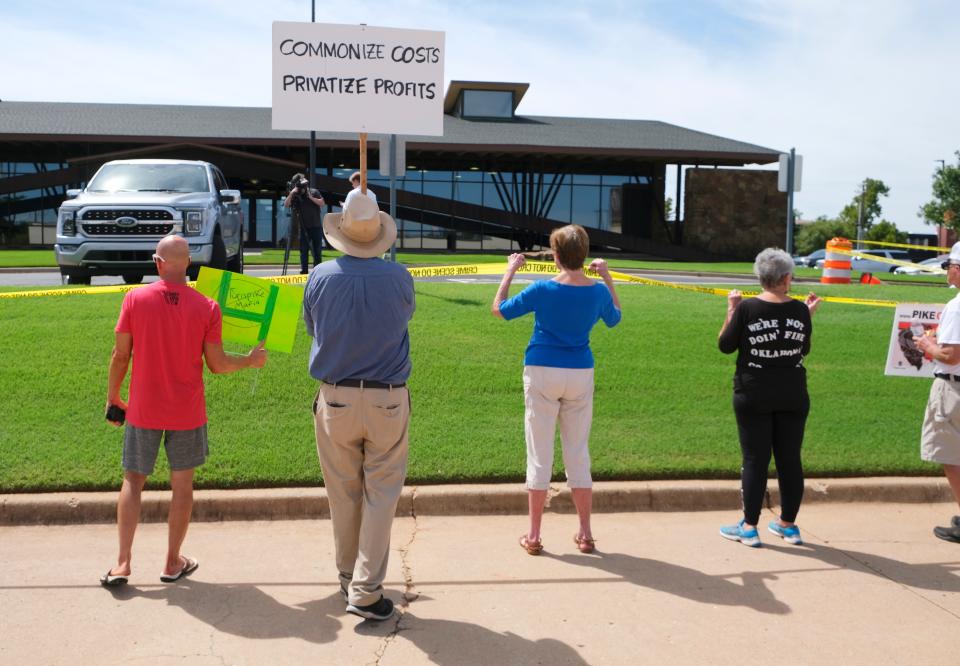Oklahoma Turnpike Authority will ask courts to restore governor's control over agency

- Oops!Something went wrong.Please try again later.
The Oklahoma Turnpike Authority is planning to go to court over legislation passed last year that dilutes a governor’s power over appointments to the commission that oversees the agency.
House Bill 2263 ended exclusive gubernatorial control over appointments to the turnpike authority board. The bill was vetoed by Stitt, but that veto was overridden by lawmakers.
Turnpike commissioners unanimously voted to challenge the law, which also requires that they file annual financial reports disclosing potential conflicts of interest.
Commission chair John Jones said the law, left unchallenged, could put at risk any actions taken including implementation of the controversial 15-year, $5 billion ACCESS Oklahoma toll road expansions.
“The board has been advised by its attorneys this violates the separation of power doctrine and is thereby unconstitutional,” Jones said. “The OTA’s board of directors is not an advisory group. The board members are a governing board of an executive branch created to execute all that is asked of it by the legislature.”
Commissioners Dana Webber and Todd Cone said they do not want the legal challenge to be seen as an “adversarial” action. They said without a court review of the law, it could put their actions, including implementation of ACCESS Oklahoma, in legal peril.
“We are obviously concerned this action will upset some people,” Webber said. “We have always had a very good and positive relationship with the Legislature.”
Oklahoma law was a legislative effort to increase accountability at turnpike authority
The effort to curb the governor’s power over the turnpike authority coincides with an effort to curb his power over the Oklahoma Tourism and Recreation Department and questions raised about his power over the Oklahoma Department of Corrections and the Oklahoma State Department of Health.
Hundreds of property owners in Norman and surrounding areas facing loss of their homes to construction of new toll roads asked lawmakers to pass HB 2263 as turnpike commissioners rebuffed their complaints and limited public comment at their meetings.
More: Is the Oklahoma Turnpike Authority 'spying' on people? Here's what Public Eye found
Rep. Danny Sterling, R-Noble, authored HB 2263, which was the only filing to become law from an array of legislative efforts to increase accountability at the turnpike authority.
"I just think that the primary purpose of HB 2263 was to prevent one governmental position (the governor's position) from controlling who is selected to serve on the board,” Sterling said. “In turn, this scenario could create the situation of board members who would be selected to ensure that the governor would basically control the future turnpike projects.”
Sterling said one concern with the old process was that it could potentially be a benefit financially in the future for whoever is serving as governor.
“This could possibly be manifested in land and property investments that would be in the path of future turnpikes, that the general public would not be privy to,” Sterling said. “I am not directing this in reference to the current governor and I am definitely not saying he would be involved in any unscrupulous business practices because of his control of the board members selection process.”
The law includes a requirement for commissioners to file financial statements disclosing any conflicts of interest. A turnpike authority representative said Tuesday that part of HB 2263 is not being challenged. Sterling said he believes one person with singular control over turnpike authority decisions could “ultimately be problematic for our state now and in the future.”
OTA's proposed legal action discussed with governor

Gov. Kevin Stitt, a vocal promoter of ACCESS Oklahoma, vetoed HB 2263 on May 19, 2023, only to see that veto overridden by both houses of the Legislature.
Instead of selecting individuals for all six seats on the turnpike authority board, HB 2263 limits the governor to two selections moving forward. Two more will be made by the speaker of the house and two by the senate president pro tempore.
The first legislative appointment under the new law quietly took place when Senate President Pro Tempore Greg Treat, R-Oklahoma City, appointed John Titsworth to the turnpike authority commission following him being held over in the position by Stitt last summer.
Stitt could not be reached for comment on Tuesday, but he argued the bill was unconstitutional as part of his written veto.
“Under Oklahoma law, the Oklahoma Turnpike Authority engages in exclusively executive functions, most predominantly to implement turnpike projects authorized by the Legislature,” Stitt wrote. “While the legislature has the authority to make law. it does not have the power to carry it out or to appoint agents charged with the duty of enforcement-a purely executive function. Simply put, although the legislature declares policy, it cannot oversee the execution of the policy it declares.”
Tim Gatz, who serves as secretary of transportation and as executive director of the turnpike authority, told The Oklahoman he asked the agency’s attorneys to advise the board on how it should respond to HB 2263 following the governor’s veto. He said he discussed the potential legal action with Stitt prior to Tuesday’s vote.
“Did he instruct me?” Gatz said. “No. Did he make sure we were aware of the veto message and constitutional concerns? Absolutely.”
Gatz said governors have appointed turnpike commissioners since the agency was created in 1947. A 2019 law split transportation commission appointments with the governor retaining five appointments and the house speaker and senate pro-tempore given two appointments each. Gatz said that split, unlike HB 2263, still gave the governor majority control over the transportation commission.
“That's worked fine,” Gatz said. “We haven’t had any issues with the commission. We expect and anticipate that members ask good questions and that they expect the agencies to make sure they are fully informed on the decisions they make.”
ACCESS Oklahoma was delayed by a year due to legal and political challenges waged by Norman-area residents who joined together to form Oklahomans for Responsible Transportation (formerly known as Pike-Off OTA).
Amy Cerato, a member of the group, said Tuesday she is disappointed but not surprised by the pending legal challenge. She warned a return to exclusive gubernatorial control over the turnpike authority can lead to corruption and poor financial planning.
“It's disappointing that the OTA rejects all attempts t0 provide oversight and accountability measures to their organization,” Cerato said. “The bill was meant to allow the people of Oklahoma to have a voice in the transportation planning process. The governor’s office is suggesting that the person in office who understands transportation planning is him.”
This article originally appeared on Oklahoman: Oklahoma Turnpike Authority aims to restore governor control over agency

